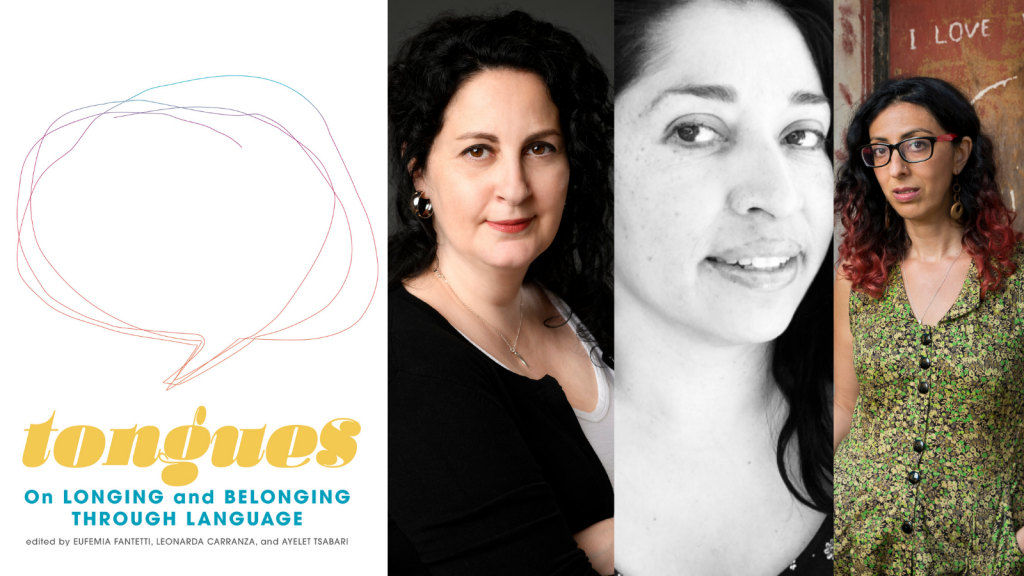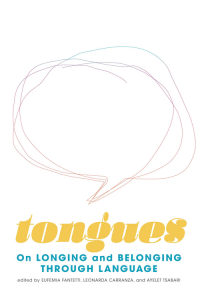Fall 2021 Nonfiction Preview: Tongues: On Longing and Belonging through Language

Our Fall 2021 preview series continues with Tongues: On Longing and Belonging through Language, edited by Eufemia Fantetti, Leonarda Carranza, and Ayelet Tsabari! This vital anthology opens a compelling dialogue about language diversity and probes the importance of language in our identity and the ways in which it shapes us.
In this collection of deeply personal essays, twenty-six writers explore their connection with language, accents, and vocabularies, and contend with the ways these can be used as both bridge and weapon. Some explore the way power and privilege affect language learning, especially the shame and exclusion often felt by non-native English speakers in a white, settler, colonial nation. Some confront the pain of losing a mother tongue or an ancestral language along with the loss of community and highlight the empowerment that comes with reclamation. Others celebrate the joys of learning a new language and the power of connection. All underscore how language can offer both transformation and collective healing.
This highly anticipated essay collection has been garnering a lot of pre-publication attention, having already appeared on several ‘Most Anticipated’ Fall preview lists, including CBC Books, the Toronto Star, Quill and Quire, and Stir Magazine. In a starred review for Quill and Quire, Sheniz Janmohamed writes, “Astonishingly consistent in calibre, Tongues: On Longing and Belonging through Language is one of the finest anthologies published in recent years and should be required reading on syllabuses across the country.”
Tongues: On Longing and Belonging through Language includes contributions by Kamal Al-Solaylee, Jenny Heijun Wills, Karen McBride, Melissa Bull, Leonarda Carranza, Adam Pottle, Kai Cheng Thom, Sigal Samuel, Rebecca Fisseha, Hege Anita Jakobsen Lepri, Logan Broeckaert, Taslim Jaffer, Ashley Hynd, Jagtar Kaur Atwal, Téa Mutonji, Rowan McCandless, Sahar Golshan, Camila Justino, Amanda Leduc, Ayelet Tsabari, Carrianne Leung, Janet Hong, Danny Ramadan, Sadiqa de Meijer, Jónína Kirton, and Eufemia Fantetti.
We’re pleased to share the Introduction—penned by the Tongues editorial collective, Eufemia Fantetti, Leonarda Carranza, and Ayelet Tsabari—below. Enjoy! Tongues will be released on October 26 and is available now for pre-order from our online shop, or from your local independent bookseller.

Tongues is a book we dreamt up together, both separately and collectively. At some point or another, two of us walked down a wintry Toronto street speaking of a book just like this one. At another point, maybe in the spring, one of us called another to discuss how this idea could become reality. As immigrants and daughters of immigrants, as racialized women, as writers who lost their mother tongues or their ancestral languages, as English-as-a-second-language learners, we share a curiosity and passion about language.
We had the unique opportunity to work on this collection of essays during a pandemic. As the world went into isolation, cities locked down, and people were told to stay apart, we had the honour of inviting twenty-three distinct voices who shared our fascination and love of language to join this conversation. Essays arrived throughout the summer and into the fall—and as our lives shrunk and a restricted world became the new normal, the collection grew in breadth and scope. The essays bridged the distance, anchored and moved us, and eased our loneliness, much like language itself can do. We were reminded of Kai Cheng Thom’s essay where she defines language as “the fluid within the collective body: like plasma, like blood, like spinal fluid, it carries nutrients and information from one unit to the next.”
Personal, lyrical, and candid, the essays in this collection investigate the intimate relationship between identity and language, confront the pain of losing a mother tongue or an ancestral language, and celebrate the joys and empowerment that come with reclamation. “I use Anishinaabemowin in my work as a way to reclaim my culture, for just as Cedar is rooted in the earth, so my culture is rooted in the language,” writes Ashley Hynd in her essay, “The Seven Grandfathers and Translation.” Others admit to purposely unlearning their mother tongue as an act of survival. As Kamal Al-Solaylee writes in “Tongue-Tied,” forgetting Arabic was “part of a journey of self-reinvention.”
We envisioned an anthology that would celebrate the richness and aliveness of Canada’s language diversity. There are more than seventy Indigenous languages and over two hundred mother tongues spoken in Canada. Some 7.4 million Canadians speak French, and 5.8 million Canadians speak at least two languages at home. Yet the irony of this project was not lost on us. Here we were editing an anthology about language written in one language and one language only, “the winner’s English,” Melissa Bull calls it in her essay, “English Baby.”
The legacy of colonialism is not ignored in these pages, as writers hold English and its colonial violence to account. The contributors to this anthology challenge us to think about the intricate relationship between English and privilege, and how power affects language learning, specifically the experience of learning English in Canada—a predominantly white, settler, colonial nation—and the shame and exclusion that often come with second-language learning. They demand that we think deeply about the languages we acquire, the languages we lose, the ones that are taken from us, and the ones we fight and struggle to reclaim. These essays are transformative. They confront us with the exclusionary, daily violence of racist, ableist, and cis-normative language. In “It’s Just a Figure of Speech,” Amanda Leduc asks us to consider our complicity with ableist language and how it “reinforces the idea that there is only one way to be in the world.” In “Gender Fluent,” Logan Broeckaert reflects on how gendered language affects the way we see ourselves and our place in the world, and in “What Are You? A Field Study,” Rowan McCandless magnifies the way that white supremacy and othering appear in everyday talk.
While the scope of this project was such that it didn’t allow for translated works to be included, we hope the many languages that make an appearance throughout the various texts pay tribute to the multilingual Canada we know. We hope they inspire readers to think more deeply about the act of italicizing (a choice of marking “foreign” language in texts, which Rebecca Fisseha examines at length in her essay, “Say Something in Your Language”) and its relationship to othering. As for when to italicize, we allowed the writers to make their own choices on the matter.
Welcome to a series of profound, compelling personal narratives that explore the interrelationship between language, power, and privilege. As editors and writers, we invite you to join in and share our curiosity about the multiple ways that language lives and breathes inside each of us.
Eufemia Fantetti
Leonarda Carranza
Ayelet Tsabari
—
Stay tuned on the Book*hug Blog for more exclusive excerpts as we continue to dive more deeply into our Fall 2021 season. And if you haven’t already done so, follow Book*hug on Facebook, Instagram, Twitter, and now TikTok.
Eufemia Fantetti is a graduate of The Writer’s Studio at Simon Fraser University and holds an MFA in Creative Writing from the University of Guelph. Her short fiction collection, A Recipe for Disaster and Other Unlikely Tales of Love, was runner up for the Danuta Gleed Literary Award and winner of the F.G. Bressani Prize. She is a winner of the Event Magazine Non-Fiction Contest, and a three-time winner of the annual Accenti Writing Contest. Her writing has been nominated for the Creative Nonfiction Collective Readers’ Choice Award and was listed as a notable essay in the Best American Essay Series. My Father, Fortune-tellers and Me: A Memoir was released in 2019. She teaches at Humber College and the University of Guelph-Humber and co-edits The Humber Literary Review. She lives in Toronto.
Leonarda Carranza was raised in Tkaronto and born in El Salvador to a mixed-race family of Afro-Indigenous ancestry. She currently resides in Brampton, Ontario, part of the Treaty Lands and Territory of the Mississaugas of the Credit. She holds a PhD in social justice education from the University of Toronto. Her children’s book, Abuelita and Me, will be published in 2022. She is the winner of Briarpatch Magazine’sWriting in the Margins contest, was shortlisted for PRISM International’s short forms contest, and won Room’s 2018 short forms contest for her piece, “White Spaces Brown Bodies.”
Ayelet Tsabari was born in Israel to a large family of Yemeni descent. She wrote her first story in English in 2007. She is the author of The Art of Leaving, winner of the Canadian Jewish Literary Award for Memoir, finalist for the Writer’s Trust Hilary Weston Prize, finalist for the Vine Awards for Nonfiction, and an Apple Books, CBC Books, and Kirkus Review Best Book of 2019. Her first book, The Best Place on Earth, won both the Sami Rohr Prize for Jewish Literature and the Edward Lewis Wallant Award for Jewish Fiction, was longlisted for the Frank O’Connor International Short Story Award, was a New York Times Book Review Editors’ Choice and Kirkus Review Best Book of 2016, and has been published internationally. Her translations appeared in the New Quarterly, Berlin Quarterly, Paper Brigade, and Mantis. She teaches creative writing at The University of King’s College MFA, the University of Guelph Creative Writing MFA, and at Tel Aviv University. She lives in Toronto.

